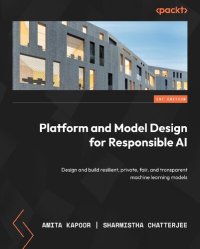
Ebook: Platform and Model Design for Responsible AI: Design and build resilient, private, fair, and transparent machine learning models
- Publisher: Packt Publishing
- Language: English
- pdf
Craft ethical AI projects with privacy, fairness, and risk assessment features for scalable and distributed systems while maintaining explainability and sustainability
Purchase of the print or Kindle book includes a free PDF eBook
Key Features
- Learn risk assessment for machine learning frameworks in a global landscape
- Discover patterns for next-generation AI ecosystems for successful product design
- Make explainable predictions for privacy and fairness-enabled ML training
Book Description
AI algorithms are ubiquitous and used for tasks, from recruiting to deciding who will get a loan. With such widespread use of AI in the decision-making process, it's necessary to build an explainable, responsible, transparent, and trustworthy AI-enabled system. With Platform and Model Design for Responsible AI, you'll be able to make existing black box models transparent.
You'll be able to identify and eliminate bias in your models, deal with uncertainty arising from both data and model limitations, and provide a responsible AI solution. You'll start by designing ethical models for traditional and deep learning ML models, as well as deploying them in a sustainable production setup. After that, you'll learn how to set up data pipelines, validate datasets, and set up component microservices in a secure and private way in any cloud-agnostic framework. You'll then build a fair and private ML model with proper constraints, tune the hyperparameters, and evaluate the model metrics.
By the end of this book, you'll know the best practices to comply with data privacy and ethics laws, in addition to the techniques needed for data anonymization. You'll be able to develop models with explainability, store them in feature stores, and handle uncertainty in model predictions.
What you will learn
- Understand the threats and risks involved in ML models
- Discover varying levels of risk mitigation strategies and risk tiering tools
- Apply traditional and deep learning optimization techniques efficiently
- Build auditable and interpretable ML models and feature stores
- Understand the concept of uncertainty and explore model explainability tools
- Develop models for different clouds including AWS, Azure, and GCP
- Explore ML orchestration tools such as Kubeflow and Vertex AI
- Incorporate privacy and fairness in ML models from design to deployment
Who this book is for
This book is for experienced machine learning professionals looking to understand the risks and leakages of ML models and frameworks, and learn to develop and use reusable components to reduce effort and cost in setting up and maintaining the AI ecosystem.
Table of Contents
- Risks and Attacks on ML Models
- The Emergence of Risk-Averse Methodologies and Frameworks
- Regulations and Policies Surrounding Trustworthy AI
- Privacy Management in Big Data and Model Design Pipelines
- ML Pipeline, Model Evaluation and Handling Uncertainty
- Hyperparameter Tuning, MLOPS, and AutoML
- Fairness Notions and Fain Data Generation
- Fairness in Model Optimization
- Model Explainability
- Ethics and Model Governance
- The Ethics of Model Adaptability
- Building Sustainable, Enterprise-Grade AI Platforms
- Sustainable Model Life Cycle Management, Feature Stores, and Model Calibration
- Industry-Wide Use-cases